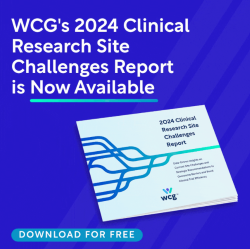This is a sponsored message.
The clinical research industry plays a vital role in advancing medical knowledge and improving healthcare; however, the increasing complexity of clinical trials has created a perfect storm of challenges for clinical research sites, posing significant risks to the efficiency, effectiveness, and sustainability of clinical trials at large. The growing complexity of clinical trials is, in part, a testament to the industry’s advancing knowledge and capabilities, but it also necessitates that research sites are provided with more robust site support and study resources to manage these increasingly sophisticated trials successfully.
According to a recent Impact Report from the Tufts Center for the Study of Drug Development, a staggering 70% of global investigative site staff reported that trials have become much more difficult to manage in the last five years. This trend of increasing trial complexity has exacerbated ongoing time constraints, resourcing issues, and enrollment challenges, while the influx of new technologies has further burdened sites. As a result, many sites are struggling to keep pace with the mounting demands of modern clinical research.
In response to these challenges, WCG conducted a comprehensive survey of more than 850 clinical research sites around the world to better understand the obstacles they face and identify opportunities for improvement.
WCG’s 2024 Clinical Research Site Challenges Report presents the full findings of this research, providing actionable insights and recommendations for clinical research sites, sponsors, contract research organizations (CROs), and service providers to work together more effectively.
Here is a sneak peek into WCG’s 2024 Clinical Research Site Challenges Report:
Top Challenges Clinical Research Sites are Facing in 2024
One of the questions we asked sites in our survey was “What are the top three issues impacting your site today?” Here are the results:
- Complexity of Clinical Trials – 38%
- Recruitment & Retention – 36%
- Study Start-up – 35%
- Site Staffing – 31%
- Long Study Initiation Timelines – 22%
- Sponsor-provided Technology – 19%
- Trial Financial Management & Payments – 19%
- Physician Interest & Engagement – 14%
- Patient Access Challenges – 13%
- Other – 11%
- Remote Monitoring – 9%
- Ethical & Regulatory Review – 7%
- Site Technology – 6%
- Decentralized Trial Components – 6%
The “Complexity of Clinical Trials” has risen to the top spot, surpassing site staffing/retention, which was the leading site challenge in 2022 and 2023. The increasing complexity of clinical trials is likely being driven by the growing demand for innovative study designs and adaptive trials, the upsurge of more complex protocols and data points, and the incorporation of new technologies.
Recruitment and retention challenges continue to plague the industry, highlighting the need for more effective strategies to attract, enroll, and retain participants. Additionally, precision medicine in oncology and other complex therapeutic areas is leading to narrower inclusion/exclusion criteria, making site selection and recruitment more challenging.
Study start-up has remained a consistent top challenge for research sites, with 35% of sites citing it as a top issue in 2024, compared to 36% in 2023. Many sites continue to struggle with study start-up processes like coverage analysis, budgets, and contracts, as highly specialized skills are needed to complete these activities.
Site staffing, while still a major challenge, has decreased significantly from 63% in 2023 to 31% in 2024, suggesting that efforts to address site staffing concerns are yielding progress. However, it remains a significant challenge for many research sites today. This improvement is also evident in the stabilization of the clinical research workforce over the last several years, as more sites invest in extensive training programs to onboard less-experienced staff and implement new talent acquisition strategies, such as offering work-from-home options.
10 Recommendations for Sites to Address These Top Site Challenges:
To overcome their primary obstacles, research sites must embrace a culture of innovation and adaptability. As a driving force behind scientific progress, clinical research sites thrive when they proactively evolve to meet the changing landscape. Key to this evolution is the continued development of specialized research talent and principal investigators, streamlined study activation timelines, and strengthened partnerships with sponsors, CROs, and service providers. By addressing the following essential elements, research sites can better position themselves for success and continue to advance clinical research:
- Elevate the Participant Experience: Focus on the participant experience; implement diversity, equity, and inclusion strategies; and leverage data and technology to optimize recruitment, enrollment, and retention.
- Invest in Staff Development: Invest in staff training and prioritize approaches to staff retention, including ongoing educational development and networking opportunities.
- Optimize Operational Efficiency: Document, simplify, and standardize your regularly conducted workflows, and track key metrics against industry benchmarks to identify areas of improvement.
- Communicate and Collaborate with Purpose: Foster open and proactive communication with sponsors and CROs throughout the study start-up and conduct phases, ensuring seamless collaboration and timely response to your site’s needs.
- Harness Technology for Success: Leverage and invest in technology systems that optimize your workflows and streamline research operations, and designate an information technology liaison to oversee research-related technology systems at your site.
- Streamline by Strategically Outsourcing: Analyze your site’s workflows to pinpoint areas where gaps exist and explore opportunities to outsource non-core functions like study start-up, study identification, and data entry to clinical services companies.
- Clearly Define Roles and Responsibilities: Clearly define and communicate the roles and responsibilities for each trial to your site staff, ensuring everyone is well-informed and equipped to work together effectively.
- Ensure Quality and Compliance: Adopt a quality management system and identify best practices to ensure regulatory requirements are met and quality metrics are evaluated.
- Cultivate Strategic Partnerships: Participate in forums and conversations with sponsors, CROs, and service providers to build stronger relationships and enhance transparency about operational needs, technology solutions, and best practices.
- Foster Innovation: Innovate for the future, not from the past. Launch pilot projects to test new ideas, experiment, and discover better solutions for tomorrow.
Interested in getting deeper insights into the current landscape of clinical research sites? Visit the WCG website to get your free copy of the 2024 Clinical Research Site Challenges Report.



